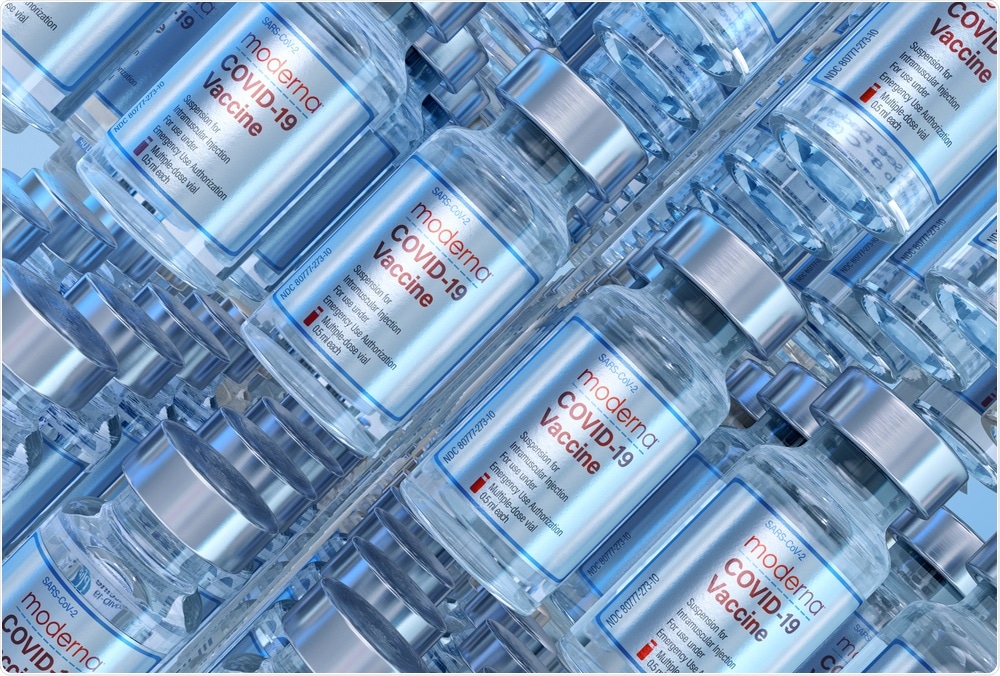As vaccine efforts against the severe acute respiratory syndrome coronavirus 2 (SARS-CoV-2), the virus that causes the coronavirus disease, roll out in various countries, Moderna ups the game by testing its next-generation COVID-19 vaccine.

Called the messenger ribonucleic acid 1283 (mRNA-1283), the vaccine is a potential refrigerator-stable vaccine that could aid in the easier distribution, handling, and administration in vast settings.
The Phase 1 study of mRNA-1283 commenced on March 15, 2021, and will test the vaccine's efficacy, safety, and stability. The vaccine can be stored in refrigerators instead of freezers, which has been a problem in the current vaccination campaign as not all countries are equipped with the needed freezers for vaccine storage.
As a result, it will be easier to reach as many countries, including the developing ones, where supply chain issues could hamper vaccination drives.
"Our investments in our mRNA platform have enabled us to develop this next generation vaccine candidate, which is a potential refrigerator-stable vaccine that could facilitate easier distribution and administration in a wider range of settings, including developing countries. We remain committed to helping address this ongoing public health emergency," Stéphane Bancel, Chief Executive Officer of Moderna, said in a statement.
The mRNA-1283 COVID-19 vaccine
The Moderna COVID-19 vaccine is an mRNA-based vaccine against SARS-CoV-2. It was co-developed with the National Institute of Allergy and Infectious Disease's (NIAID) Vaccine Research Center.
Moderna's first COVID-19 vaccine, mRNA-1273, needs to be stored at freezing temperatures to stay potent, stable, and safe. Nearly 3 billion people live in countries where temperature-controlled storage is not available for vaccination campaigns against the coronavirus pandemic.
With the new mRNA-1283 COVID-19 vaccine, more people can receive the shot. Moderna said that the Phase 1 study of mRNA-1283 would assess three dose levels administered to healthy adults in a single dose. The team plans to compare the effects, stability, and safety of the vaccine with the two-dose series of Moderna COVID-19 vaccines used across the United States.
The investigators will assess three doses of the vaccine, 10 µg, 30 µg, and 100 µg, given to healthy adults as a two-dose series, 28 days apart, and one dose level, 100 µg, of mRNA-1283 given to healthy adults in a single dose. The results will also be compared with the two-dose series of 100 µg of mRNA-1273, the currently used vaccine dose.
Future studies also intend to determine if the vaccine can be used as a booster for previously vaccinated or seropositive and primary seronegative individuals.
Vaccination efforts
The Moderna mRNA-1273 vaccine phase 1 study showed that the participants retained high levels of neutralizing antibodies 119 days following their first dose.
The U.S. Food and Drug Administration authorized the emergency use of the Moderna COVID-19 vaccine in people 18 years old and above in the United States. Other countries like Canada, the United Kingdom, Israel, the European Union, Switzerland, Qatar, and Singapore are also using the vaccine as authorized by respective regulatory bodies.
Currently, the vaccine awaits additional authorizations in other countries and by the World Health Organization (WHO).
The distribution of vaccines is crucial in the fight against the COVID-19 pandemic. To date, the coronavirus pandemic case toll has reached 120.26 million people. The death toll has now topped 2.66 million.
The United States reports a staggering 29.56 million cases and over 536,000 deaths. Other countries with skyrocketing cases include Brazil, with over 11.6 million cases, India, with 11.4 million cases, Russia, with 4.36 million cases; and the United Kingdom, with over 4.28 million cases.
- Moderna. (2021). First Participants Dosed in Phase 1 Study Evaluating mRNA-1283, Moderna's Next Generation COVID-19 Vaccine. https://investors.modernatx.com/news-releases/news-release-details/first-participants-dosed-phase-1-study-evaluating-mrna-1283
- COVID-19 Dashboard by the Center for Systems Science and Engineering (CSSE) at Johns Hopkins University (JHU). https://gisanddata.maps.arcgis.com/apps/opsdashboard/index.html#/bda7594740fd40299423467b48e9ecf6
Posted in: Drug Trial News | Medical Research News | Disease/Infection News
Tags: Allergy, Antibodies, Coronavirus, Coronavirus Disease COVID-19, Efficacy, Freezers, Next Generation, Pandemic, Public Health, Research, Respiratory, Ribonucleic Acid, SARS, SARS-CoV-2, Severe Acute Respiratory, Severe Acute Respiratory Syndrome, Syndrome, Vaccine, Virus

Written by
Angela Betsaida B. Laguipo
Angela is a nurse by profession and a writer by heart. She graduated with honors (Cum Laude) for her Bachelor of Nursing degree at the University of Baguio, Philippines. She is currently completing her Master's Degree where she specialized in Maternal and Child Nursing and worked as a clinical instructor and educator in the School of Nursing at the University of Baguio.
Source: Read Full Article






